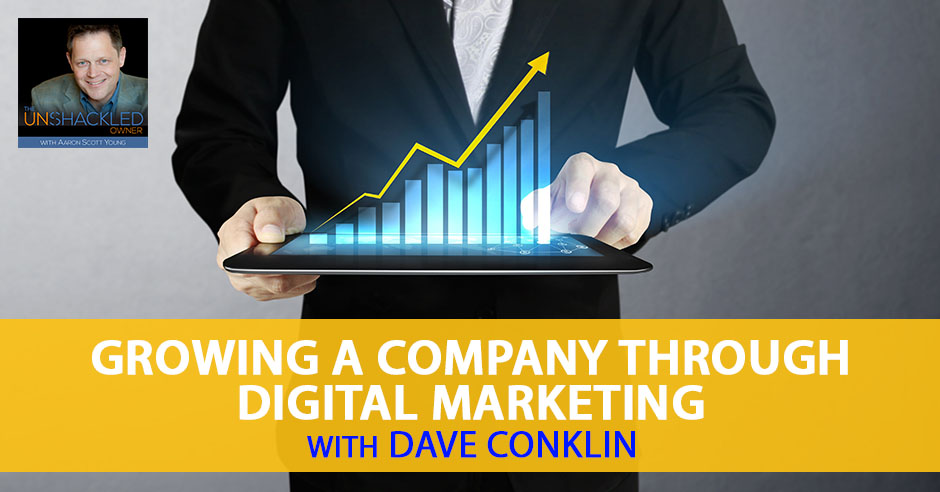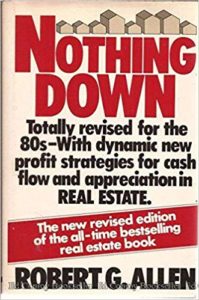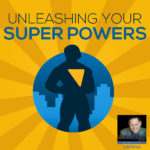
—
Listen To The Episode Here
Growing A Company Through Digital Marketing with Dave Conklin
I’m delighted to be back with you again for another great interview as I’m interviewing CEOs of companies that are out there making a real difference, providing you the knowledge, tools and training that you need to become unshackled. You’re going to love our guest. He’s a tremendously successful guy who’s got some cool new tools that you’re going to want to hear about.
—
I’m with a great guy named Dave Conklin of Conklin Media. Dave, how are you?
I’m absolutely amazing, Aaron. Thank you so much.
Dave is a fellow that I met a number of years ago at a business event. The thing that was interesting was he had recently sold his successful web development company or web marketing company and gone in as a partner with another company who’s had tremendous success. I won’t name the name of that company but I know that their owner told me that they would break $50 million, which was the biggest year of their career, multiple years on the Inc. 5000 list. They grew and grew a lot of their success and he told me based on your genius that you brought in. I remember you called me and said, “I love this company. I love the owner but it’s becoming a little too corporate for me. I need to step out and get back into something where I’m controlling it.” It’s funny because that happened with me with my one job in my last 35 years of career.
When I gave notice they said, “Is something wrong?” I remember very vividly saying, “No, there’s nothing wrong. This is your dream, not my dream and I need to go back and get after my dreams again.” Not because there was a problem, only because there were new mountains to climb. You started Conklin Media and have in a very short amount of time scaled up again. You got lots of clients, a bunch of employees again, a couple dozen employees and growing fast and working at a pretty intimate level with a lot of companies, some named brands, maybe some people don’t know. The point is you gained the trust of people in power very quickly. Do you only work with big companies or do you work with the little guy as well?
We work with a lot of companies. The big thing is the average ticket per client. If there’s a smaller company but they’re going to make $50,000 or $10,000 off of a new client then we’ve got stuff that we can do for them for sure.
There’s got to be enough value for them to engage you.
We actually look at it on a scale where it’s either a quantity or a quality of client. AutoFloorGuard is a company that provides a garage floor mat and it is $150. They’re in Costco. They’re a nice sized company. They are doing decent volume. Because there’s enough traffic for that product and the margins are good, we’ve done some tremendous things for them. Our more successful clients are definitely the people who have a $10,000, $20,000 price tag.
That makes sense because you guys do high-quality work but if you can sell one or two or three $10,000 products a month and you’re a small business, that’s good revenue. I want to understand better what got you to where you are because there are so many people out there that believe there’s some magic wand to getting success. This podcast tries to eliminate this path and it’s interesting sometimes there’s an outlier and other times, there are this common set of things that happen. The more people can hear this and identify with those stories, not only do they get confidence but they can shortcut their path by avoiding problems. Where were you born? Where were you when you were a little kid?
The first seven years of my life was on a farm in New Providence, Pennsylvania, which is one of those towns that you blink and you miss. We are very close to the Amish. We’re in Lancaster County, Pennsylvania. It’s right around the Amish and all those things. My parents were frustrated ironically because my school district there didn’t have computers yet. All the other school districts in the area were getting these computers. They rented a house on this farm. We didn’t own the farm. We actually moved into affordable housing.
Are you the oldest in your family?
I’m not, I have a sister who’s eight years older.
They thought, “We need the sister for sure to have access to computers.”
She was already in Kentucky at that point. She had dropped out of school and left. I have a very interesting story. We ended up moving into this apartment complex and my sister was already gone. I felt like an only child growing up. I’m close to my sister. It wasn’t then at all. I grew up there. I had some bad influences around me and things like that. When I was in middle school, my parents moved into another community where they bought a house but more negative influences and things and I actually dropped out of school.
You said negative influences twice, are you saying that for whatever reason your folks didn’t have a lot of money, so you ended up living in some lower or middle-class neighborhoods or lower income neighborhoods? I don’t want to overstate this or make it melodramatic but you came out of a step up from the projects?
I wouldn’t go that far. The kids that I was hanging out with didn’t have wise parents typically. The kids were alone a lot while their parents were at work and things like that. I wouldn’t say the projects.
It’s latchkey kids who are left to their own devices, not a lot to do but to hang out.
I was in third grade, I burnt down a field and had nine firetrucks show up. All those fun stuff.
This is only third grade. Jumped up to middle school, high school, tell me about your circumstance there.
Middle school and high school, I was always motivated. I started a DJ to a radio show at my middle school and then I went into ninth grade. It was wild because I was actually in gifted but I was getting D’s on my report card. My guidance counselor would meet all the time and talk about how irritated she was that I wasn’t living up to my potential and all these things. It was November of my tenth-grade year, I missed a ton of school up until then. My chemistry teacher told me that he was going to fail me if I missed any more school. I had a B in my chemistry class at the time. He pulled out the handbook and he showed me where in the handbook it states that if you missed so much school you automatically fail. We get through, we did this huge test and I got to be on the test and he gave me an F on the test and an F in the whole thing. He claimed I was cheating, all these things and I told him that if I get an F on that test, I’m done school. He gave me an F and I never went back to school. My parents got truancy fines and I worked and paid the truancy fines until I officially got my GED.

Digital Marketing: When you’re shackled to your business and you’re the one that has to do the cold calling, the funnel dries up.
At what age did you drop out then?
Sixteen.
This weird little circus is not working for me. You’ve got your GED. A lot of people think is like a black eye. My youngest son, a brilliant kid, great on tests, great on understanding and great vocabulary. He didn’t like to do homework. Even if he did the homework, he wouldn’t turn it in. Just an absent-minded professor kid. I asked his counselor and he said, “I have him dropped out and get a GED. He’s not cut out for this insanity of the school system.” He went out there aced the GEDs and he’s going to one of the top universities in Japan on a scholarship. They turned down 90% of their applicants, he’s there in Japan on a scholarship, no SATs, no high school choir or whatever. Brilliance isn’t going to be forwarded. It’s up to Dave Conklin or Chase Young to put up their own barriers because you’re too smart and too capable to have other people block you. You’re smart and you’re motivated. You’re going to do your own thing. You dropped out, you got your GED then what happened?
My big dream at that time in my life and you never know, you might see this happen. I wanted to be an EDM producer, Electronic Dance Music. Avicii that we lost, Deadmau5, Marshmello, all these current pop artists that are onstage in front of 60,000 people, that’s what I wanted to do. I wanted to make remixes and all that stuff. I cold called over and over again a local company, they have like 30 DJs and they would DJ these corporate events, weddings and things. I called them so much. They finally were like, “Come in and freaking talk to us.” I went in, they said, “No, you don’t know anything about anything.” I said, “I’ll work for free.” They were like, “Really?” What happened was there was a situation. I believe it was a wedding. All I know is I was sixteen and they were adults. It was either a corporate event or a wedding but I remember taking the mic because the DJ was in the bathroom that I was working with. I’ve grabbed the mic, started talking and got people up and dancing and the guy came back and said, “What are you doing?” They actually started paying me. I ended up running that DJ company for the owner and I was in charge of 35 DJs, ended up going to the International DJ Expo and doing some competitions and stuff.
Were you even old enough to get into some of these events?
No, I have stories that I’m not going to share in this podcast from those years.
I’m glad you’ve got to live out your fantasies early.
I was very young. No one assumed I was that young.
That’s a long way away from what you do. Did you go to college? Did you decide you needed to do that or what?
I learned that even though I’m an introvert, I have a personality that I can turn on every now and then. If you would walk into a restaurant or something and see me, you would assume that I was a sit in the corner, a recluse. In environments where I’m in front of a crowd, I can actually turn it on a little bit. I thought, I could probably sell stuff. I’m like, “What’s the biggest thing I could sell to get the biggest, fattest commission?” That was real estate. I quit my job. I called the local real estate commission and had a couple of bucks saved up. I went and got my real estate license. Once I had my real estate license, I was twenty and I sat down and I started cold calling.
I went out. I was working as a real estate agent. They had this blue phone book at the time. It was a reverse phone directory. You would open it up by zip code, then by street and then it would list all of the homes on the street. I drove around my local area, found all the expensive houses and grab that blue phone book. I literally cold called 200 calls a day. That was my goal every day, 200 calls and I would get one listing appointment a day on average. At that time that was when the real estate market was booming. I would get a listing appointment every day and I would close 75% of those. At that time if you had a listing appointment, you close that sucker. With an average house price of $150,000, $200,000 at that time, I was making $3,000 a week typically after it all cycled through.
This was at 20, 21 years old. $3,000 as somebody who would follow the traditional path, you’d have been sitting there spending a bunch of money every year to be in college instead, here you are with the GED, you’re being aggressive in finding deals. You’re doing the difficult thing, which is making 200 calls in order to get one appointment. My point is if you’re making $12,000 a month as a 21-year-old, you’re a lot younger than me.
This is the late ‘90s.
You’re going along, you’re doing that and you’re making some money. What took you away from real estate? What was your greatest lesson you’ve learned by being in real estate that’s continued to serve you?
Cold calling, gorilla on the ground, I don’t care. We literally closed a $300,000 deal from a cold call. I have people that I’ve worked within the past that cold calling doesn’t work. No, it freaking works.
Why are the Mormon missionaries walking around? I was one of those back ‘80s, knocking doors back when I was in the church. We are doing it all over the world, tens of thousands of us. If it didn’t work, the church wouldn’t have been the fastest growing Christian church in the world. It was based on knocking doors. That’s how I started my first business, the recycling business. How I started the cellular business, it was cold call. I’m a believer.
That stuck with me. That’s my roots. What I learned also is that when you’re shackled to your business and you’re the one that has to do the cold calling, guess what happens when now you’ve got 50 clients to drive around and show houses to? All these houses to market, you can’t keep cold calling. What happens? The funnel dries up. I didn’t know anything about funnels. I never took any training or anything like that. All I knew is that all the sudden I went from making $12,000 a month to making $2,000 a month for three months in a row. I was a dumb young person that didn’t have a whole lot of financial wisdom installed into his life in the past. I was spending every penny and I’m like, “What do I do?” I’m like, “I need a website that’ll get me these leads rather than having to go out and bang on these doors all the time.” That led me into the next phase of my journey.
Here we are in the late ‘90s. Websites didn’t start getting into vogue until ‘95, ‘96, ‘97 and then of course there was the dot-com explosion. Was it 1999, 2000 when they all crashed, when the implosion of the bubble happened?
Shortly after 2000, they were all in complete flames.
That’s when the government lowered interest rates and then the real estate market took off until 2008 when it imploded on a bubble. That was dramatically lowering interest rates from 10%, 12%, 14% to almost 0%. They had to fix the dot-com mess. The dot-com bubble had created a recession and they lowered interest rates which started the real estate boom, which then have collapsed. You had enough insight probably because your parents got you around computers when you were younger, to even think about a website. I don’t think I would’ve been thinking websites to get leads in the late ‘90s. It’s basically a brochure on the web.

Digital Marketing: Customer service is saving clients.
I was keeping my eyes open. What happened was I got cold called. We had a very successful real estate team. We had probably six people working under us. Me and another gentleman named Rory Wilfong, who’s in Chicago doing real estate there. Rory and I were in real estate together and I got cold called by this company called HouseValues. They’re now Market Leader. They’re on the Stock Exchange or whatever. HouseValues was like, “We’ll charge you $600 a month and we will send you the names of people that come to our website.” I’m like, “Tell me about your website.” We had a great meeting. I realized if I really research stuff, I could make a website that does the same thing.
I had no idea what I was doing. It was New Year’s Eve of 2002 going into 2003. There’s a party at my house that my wife is hosting. I’m supposed to be hosting. I’m upstairs in our closet. We have this little closet and I’m sitting there trying to figure out how to build a website in Microsoft FrontPage. I make a website that looks exactly like HouseValues and there was this new technology that this company, Google, had come out with where you can actually pay money to buy keywords. I’m like, “What do people type in? I don’t know, house values, home values, what’s my house worth?” I upload a bunch of words to this thing. I send the traffic to my site and nothing happens and I’m pissed off. I called Rory about it, I’m like, “I think I’m going to be able to save us $600 a month,” because we wanted to do this thing with this HouseValues company.
I will never forget that moment. I’m sitting there and I hear a ding on my email. I go over and I look and it says like, “Sally so and so in zip code whatever wants her home value,” in my email. That’s how I had the site set up to fire off into my email. I’m looking at and I’m like, “Somebody just filled this out. I can’t believe it.” Here’s the problem, Staten Island, New York. I was like, “I can’t sell anything in Staten Island, New York.” I was upset. We called her up. I’m like, “You came by the site. What made you stop by?” I’ll never forget it, she said, “We’re thinking about selling. We’re not really sure.” I’m like, “How about I get you in contact with somebody in your area who we trust?” “That would be great.”
In the real estate business, there’s the 25% referral fee that goes back and forth if you refer business. I’m like, “I know her story.” I called an agent that worked with RE/MAX in Staten Island and I told him the deal. I’m like, “Give me 25% if it closes.” They’re like, “Absolutely.” We set the deal up. That’s how that whole thing launched. I bet you, I only ever sold two sales from that website that actually came local. At the time, you couldn’t market local like you can now in Google. They were coming in all over the place. It was crazy.
You were getting a lot of traffic, it just wasn’t benefiting your real estate practice?
Not at all.
You were getting these referral fees which were probably adding up because it’s now one to many. You started learning one-to-one cold calling, it works. One to many, it makes the work easier.
What we learned is that there are a lot of dishonest people out there and there were houses closing that we weren’t getting checks for. Then we changed our model to where we would basically sell a zip code for a certain dollar amount based on the average house values and how many transactions were happening in those zip codes. We then sell these zip codes to these real estate agents. We hired developers to build out the platform. We were in Inc. Magazine two years in a row for being one of the fastest growing companies in the country. It’s a really fund, great ride. Through that experience, I learned SEO. I learned pay-per-click. I learned how to do social media because that was brand spanking new. It was all forums and blogs. There weren’t these platforms like Facebook at the time. We learned how to use those channels to generate leads. The only thing that mattered to us was leads. I came out of that kind of experience from cold calling, which what matters their leads, like appointments. Then why would you do digital marketing if you’re not actually going to generate a lead? It doesn’t make any sense. I had that foundational belief, then the market tanked.
In ‘08?
We noticed it happening in ‘07.
It wasn’t just the market, also the banks got bankrupt. What did you do to pivot out of that? Did you all of a sudden have a tremendous opportunity because there were different kinds of investors coming in to buy up houses?
The biggest failure of my life in my opinion is how I pivoted that business. Looking back, we could have shifted into short sale. We could have shifted in what you said like the obvious, “There were other types of people then.” We were like, “Crap.” I’ll never forget my assistant walks into my office. We had 60 employees at the time. My assistant walks into my office and she goes, “Dave, we lost 42% of our clients last month.” I was like, “Excuse me? No, that’s impossible.” She’s like, “No.” Keep in mind our typical attrition, we would keep a client for about three years. A realtor would stay on for about three years. To have 42% of the entire client base just done, “What is going on?”
I went into our customer service area. I’m assuming somebody is not saving clients. A client wants to cancel, what can we do to save you? We had a whole team that did that. I got on the phone and I started calling people and they’re all literally telling me, “Dave, we love what you do but I’m getting out of the business.” Real estate agents don’t want to buy leads that aren’t in real estate anymore. It was a shocker. We should have done mortgage leads, which I could have done a hundred different things, but we didn’t. We kept trying to do the real estate lead thing thinking it would come back. The biggest learning experience from those years was that don’t ever be dependent on a market. One industry, don’t do it.
My second company was a meteoric success and then crush in the dirt for the same reason. I didn’t understand how to read the market. I was young and I was too successful for my own good. I crashed because I didn’t know how to pivot either. Don’t you think this is true? A lot of people that I’ve met will have a big success, sometimes huge and then they never are able to recreate it because they don’t exactly know why they were successful. They got in the right place, right time. I invested a lot in real estate in those days and you had to be an absolute fool not to be able to make money.
They were growing at 6% a year minimum in value.
I bought my first property for $53,000 and sold it for $75,000 the next year.
That’s a little more than 6%.
In the really insane days of 2005, 2006, we would go tie up a piece of property while we’re messing around with it and then wait and make sure was it was the best deal we could do. Then just in time we had it tied up, the value had gone up in two or three months while we’re doing our due diligence. Then you go ahead and sell it and make money, you’ve never even touched it. It was insane. The lesson here as you’re building your business is that Dave gave you a great example of his big disappointment as a failure to pivot properly. We both have this thing.
If you’re growing and you think you’re the amazing wonder kid, you’re driving a nice car, you’re making good money and you think, “I’ve got it figured out.” I want to tell you from experience and Dave I think would endorse this, hedge your bets, keep some money, put aside that you’re not going to jump back in when the market changes. This is your rainy day money. Then watch the older people who’ve been around longer than you. If they’re all jumping out, you jump out too. If they’re all pivoting in a different direction, you pivot too. You use some words, Dave, that I can hear myself. We thought we could ride out the storm. We thought we were big enough, successful enough and clever enough, we could ride it out. That’s wrong.
One of the kickers in that story too, was just before the market started to turn, we had an offer to purchase a company as well. I was spending that money and then all of a sudden they went quiet. How weird is that?

Digital Marketing: We have to learn to not be dependent ever on a market.
We think maybe we’re not going to do this anymore. I thought you turned down the purchase because you were so sick.
We just spent the money.
This is a mistake of somebody who hasn’t yet had to have a reckoning. They haven’t had their comeuppance. The funny thing about crashing and burning, you learn a lot of lessons quickly. You learn almost all your lessons in your failures, not in your successes. Whatever happened, there was an abrupt stop in those late 2000s.
That was in terms of revenue. We knew that we had a team though that knew how to generate leads. There was a local company who’s now incredibly successful that did security systems in commercial and residential homes. The owner came to us and said, “I’ve been watching you. I see you’re always hiring. I’ve been by your building. I see the building. I know you’re successful. I want you to generate leads for our security business.” Then Hershey chocolate ironically reached out and they were like, “We want to sell more corporate picnics at Hershey Park. It’s a huge amusement park.” They wanted to sell to the 10,000-employee picnic and close the park down. We created lead generation sites for these companies because that’s what we knew how to do. We created a microsite, a lead gen site and then send traffic to it, have some offer, generate the lead, do the Infusionsoft, Ontraport or whatever software you want to use for follow-ups. In the end, you get a lead for the sales team.
We did that and it worked out. We started a company called Prospect MX at the time. It turned into a very successful agency and still exists now, but I don’t own it anymore. That company still exists in Lancaster. What was crazy is we use the skills that we learned from the real estate lead generation and then started doing that for other people. To this day, we have a website called ProfitPaths.com, for example, where it’s this idea of creating a new profit path for your business like through a lead gen site, sending traffic there and nurturing the people and spitting them back out the other end. That idea now stems from our experience at the core of Dave needing leads for his real estate business. It goes together.
I know you do a lot of speaking, I know you do a lot of training. I know you’ve got a product that you’re working the kinks out of right now. You might want to go over to CEOKnow.com. The way I would interpret CEOKnow is companies like yours want to sell or at least companies like your old one want to sell digital solutions to drive traffic, drive leads, create value and make the website into a cash machine. Yet most CEOs don’t have any technical understanding of how this stuff works. It’s an insecure position to be in as the CEO saying, “Should we spend all this money? What’s going on when I spend all this money? Is it even working? How do I know if it’s working other than the leads that are coming in?” I feel like I’m flying in the blind here. Your CEOKnow product gives the leader who doesn’t have all the technical skill, the ability to put in their URL, their company website and see what’s working? Are we trending up? Are we trending down? What are we ranking for? Where are our opportunities? Do we have broken links? Do we have a Subscribe or a Buy button that doesn’t work? Are there things on our site that now all of a sudden simply by just accessing your tool, by putting in the URL, you’re going to tell me a lot of stuff I need without me having to know what to go out and look for. Is that an accurate representation?
That’s exactly it. When I speak at events for CEOs, we go over this really cool data. I’m talking five years now. They’ve gotten excited about it and we never had a way to do it without spending four hours with them on a call. We’ve just taken years to put these APIs and all this stuff together where we connect right to Google and Bing and a lot of the major SEO tools. We try to pull it in and spit it out in one page so that the CEO can discover things they didn’t previously know.
It gives the CEO a crosscheck, when you’re sitting down with your VP of Marketing or your Marketing Director or whatever you’ve got, the VA that’s doing marketing for you, the agency that’s doing marketing for you and say, “Here’s what I’m noticing. Can you guys explain to me why we’re trending this way or why we’re not ranking or why we’re spending money on these words? Why are we missing these opportunities?” It gives you a place to start a conversation. It gives you a measurement. As a CEO, I don’t have to know all the details of the technical side. I can just say, “Here it is in black and white. This is what’s happened. Explain to me, I’ve been paying you for this. Why are we going down when my bill is going up?”
You mentioned it’s an accountability tool and I think that’s a great way to put it.
This is a great conversation. I love your story. Let’s review. A kid not from a lot of privilege, parents that obviously loved and cared about him. Amazing parents who want him to have access to current technology who moved in an effort to get him in the right schools so he could have access to technology. Through his own motivation, overcame some of the maybe less than perfect companions that he could have had from the neighborhood but did well. He was smart in school. The grades didn’t necessarily reflect it. Finally he says, “I can’t do what these people want me to do,” so he drops out, gets a GED, goes and works for free in the industry he dreams of as a sixteen-year-old. He becomes successful there.
Let’s go back to the Bible. I’m thinking about the story of Joseph in Egypt. Joseph the young son of Israel. Everywhere he goes, he can rise up. You dropped out of school, you go to work for free and you rise to the top. You say, “Where can I sell a bunch of stuff? Let’s go to real estate. It’s a big-ticket item.” You figured out a way through cold calling so you had to rise to the top. “I can’t make enough money doing this. I could buy a site,” or in those days things were still new enough that you can create a competitive site not easily but was possible. Rise to the top, find out, “I don’t need to be selling real estate because I can sell leads in real estate and make a lot more money.”

Nothing Down: How to Buy Real Estate With Little or No Money Down
I love Robert Allen. He wrote the book, Nothing Down. It’s one of the top selling real estate books of all time. He said, “I made millions in real estate and I made tens of millions teaching real estate.” You’ve made hundreds of thousands or millions in real estate. You filled a whole building with people by generating leads for realtors, pivoted, changed your thing and ended up working. Then even when he went in and helped in the significant second chair to the founder, but the lead understanding technology guy, the creative guy helping grow another person’s company big. Then he said, “I love it. I’m glad we did it. Hooray. Success. I’ve got to go out and I’ve got to get back to being my own boss, my own entrepreneur again,” then growing fast again. I remember when you let me know you were leaving the other company because we have common relationships there, I know dozens of employees are growing fast.
Full disclosure, Dave is currently going through the Unshackled Owner class. For those of you that have ever wondered, that class is designed to not make you successful or not to get you to retire. It is to help you have a different perspective on your business so that it can grow and you can control it without having to be in the middle of every single activity of the business. I’m not asking you to do a commercial for me, Dave. I hope you’re enjoying the class because you’re only halfway through it.
I’m absolutely loving it. I’m going to interrupt you and say something about it. It’s important that people understand that I don’t have anything. I don’t have any kind of degree. One of the big things in my life has been reading. It’s how I learn stuff. One of the things I love about the Unshackled Owner is the fact that you actually share stories and examples. It’s not a lecture from Aaron Young, it’s a conversation. I’m going to have unique challenges that someone else might not have. I have the opportunity in those classes to ask questions, get answers, get feedback and it’s been super helpful for me. I’m excited to finish the class because I think it’s going to have a huge impact on the future of our business. There are already things from it literally that we are putting into play like the scorecards and different things.
Thank you for saying that. I wanted to make sure people knew, many of the people that I’ve interviewed, not all but most of them, we’ve had some experience. We’ve had a meal together, we’ve shared and we’ve worked on a board together. You and I have done a number of things since we met each other. Our paths have crossed in unusual and unexpected ways. I want to say to the audience, you’ve got to check out Conklin Media. You’ve got to see what Dave’s doing because he’s a uniquely gifted guy who has surrounded himself with a great team. He’s had one success after another.
I’ve forced him to talk about some of the challenges, but I think he can easily paint a picture of a very wildly successful trajectory with no bumps. If we hide the bumps, we don’t learn the lessons. That’s what we’re trying to do here on this program is give you guys some stories to hear, to both give you hope, guidance and a different perspective. I’d love to hear your stories. I love when I get feedback on the podcast and how it helped. I like to ask people this question and sometimes they have an answer, sometimes they don’t. Do you have a mantra or a quote or a thing that’s something you tend to base your life on or you always think about?
“Risking nothing is risking even more,” is one of those quotes that I live by. I’m a risk taker and it’s not always super calculated. It’s more of a gut kind of a thing. I like to take measurable risks. When I risk, I want to make sure that I can clearly measure the success of those risks. That’s a really big quote. It’s actually up here in my office somewhere.
There’s the old one, “Nothing ventured, nothing gained,” it’s not quite as dramatic sounding but it’s true. If you don’t do something, you’re not going to get anything. I love that you said measurable risk because folks, you’re going to take some risks that aren’t going to work. The only way to cauterize the loss is to be measuring. If you’re not measuring, you can expect to pay a high price for your experiment. If you are doing measurable things like Dave said, you can get good information really fast. If you take no risk at all, just plan to be poor. Any last words, parting wisdom you want to share with the people?
You had mentioned too before we did this, “If you have a book or something, have that in mind.” I drive my boys to school every morning and we’d listen to audiobooks together. I have the boys listening to Shoe Dog right now, which is Phil Knight, the Founder of Nike. It’s his whole story and all that. That’s probably one of the best biography style books that I’ve ever read in my life. It’s amazing. I went back and looked and I averaged 40 books a year unintentionally. It’s like some goal. It’s audio while I’m driving in the car. I’m going through The Ultimate Sales Machine and Profit First. I wouldn’t even know what to talk about. That’s the self-education thing. Coming from somebody who doesn’t even have a high school education technically, I’ve got the ninth-grade thing, here I am. Many people share with me that books are just people talking about themselves. It’s unbelievable to me the attitude that people have sometimes about it. Even people that I know that are successful often don’t want to read the book or they read the cover and they’re out. That’s been a huge part of my life. I think that’s a big reason that I’ve been able to be mildly successful.
Someone said, “Formal education will make you a living and self-education will make you a fortune.” Someone also said, “As long as you keep learning, you’ll stay young. As soon as you stop learning, you start to get old.” That’s a perfect thing, 40 books. I’m a late adopter of audiobooks. Dave, what a pleasure to have you here.

Digital Marketing: Risking nothing is risking even more.
I’m honored. Thank you.
What a pleasure to know you and see the work you’re doing and see how you help people grow their businesses. It’s another one of those things with Zig Ziglar, “If you want to get everything you want, help thousands of other people get what they want.” That’s been the secret of your success. Help everybody else that they need and it comes back tenfold to you. Thanks for being here. Thanks for the work you’re doing. To the audience, go to Conklin Media. Go check it out. Go try to get into CEOKnow.com.
Thanks again for coming on. All of you, guys, these are the lessons that I bring to you, the stories, the shortcuts, the time to sit and know you’re not alone in this journey of entrepreneurship. Share the podcast with your friends. Go out there and like us and write a review. If you want to talk to us about how you can become an Unshackled Owner, go to Support@AaronScottYoung.com. Let’s talk about it. Let’s make sure that you can make rapid progress by surrounding yourself with great people, learning the lessons and putting the practices into place that will make you into an Unshackled Owner. I look forward to talking to you again in the next episode.
Important Links:
- Conklin Media
- Market Leader
- ProfitPaths.com
- CEOKnow.com
- Nothing Down
- Unshackled Owner class
- Shoe Dog
- The Ultimate Sales Machine
- Profit First
- Support@AaronScottYoung.com
About Dave Conklin
 Dave Conklin has been a leader in using digital communication strategies to grow businesses since the late 90s. During those years, he took a small local real estate business and developed a method for meeting new real estate customers through the web. This turned into a company with 60 employees and more than ten thousands customers. The company was featured in Inc Magazine’s list of fastest growing companies (The Inc 500 List) 2 years in a row.
Dave Conklin has been a leader in using digital communication strategies to grow businesses since the late 90s. During those years, he took a small local real estate business and developed a method for meeting new real estate customers through the web. This turned into a company with 60 employees and more than ten thousands customers. The company was featured in Inc Magazine’s list of fastest growing companies (The Inc 500 List) 2 years in a row.
When the real estate market hit its downward trajectory in the mid to late 2000s, Dave and his partners pivoted their team into a digital marketing company that helped hundreds of businesses to generate leads, save money, and increase profits. Some of these companies included publicly traded companies like Armstrong World Industries and Hershey Chocolate as well as medium-sized businesses.
Dave has since become a well-known thought leader and speaker known for his ability to help CEOs and other non-marketing focussed executives to understand digital marketing. His ability to bring clarity to “non-techy” executives through his tools like CEOKnow.com has made him and his team at Conklin Media sought after consultants and implementers of strategy.
Personally, Dave is involved in his church, community, and water projects in developing countries around the globe. His proudest achievements are his two sets of twins and his amazing wife, Jodi.
- AaronScottYoung.com
- The Unshackled Owner Twitter
- The Unshackled Owner Facebook
- Aaron Scott Young LinkedIn



